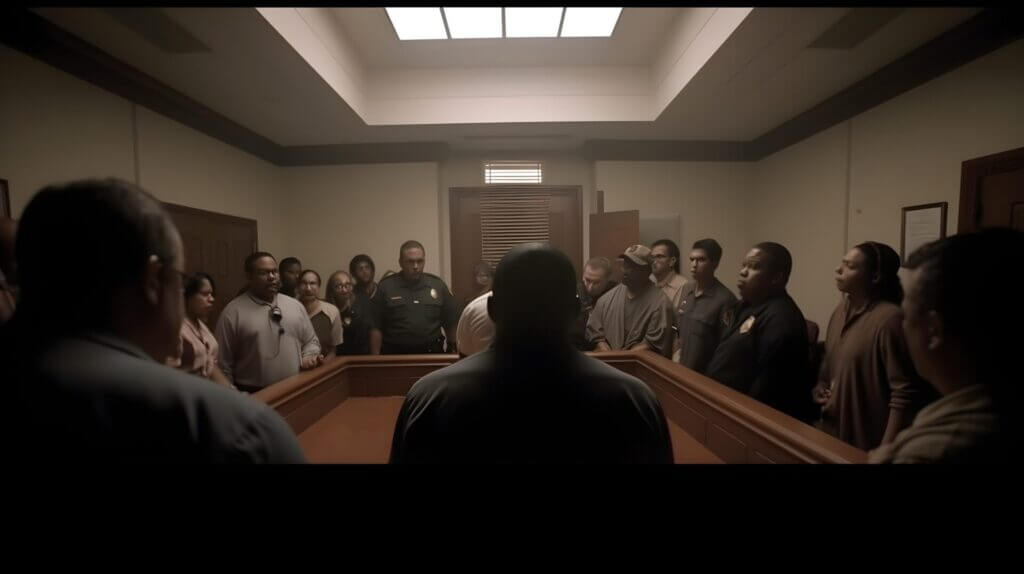Deportation is perhaps one of the greatest fears and challenges facing any migrant in the United States. Receiving a deportation order can be devastating, particularly when you have family and children in the country.
But don’t despair, if you meet certain requirements you may be able to obtain cancellation of removal. In this article, the experts at Urbina Immigration Law will analyze what a deportation defense looks like and what is needed to successfully complete it.
Table of Contents
What is a deportation proceeding?
Deportation is the legal process to repatriate an alien who has violated U.S. immigration laws. It begins with a notice from USCIS, followed by a hearing before an immigration judge, during which you can present a defense to deportation with the help of a specialized attorney.
What is deportation defense?
Deportation defense is the set of legal strategies used to defend an alien facing deportation proceedings. It seeks to challenge the removal order or find legal remedies so that the alien can legally remain in the United States.

What should I consider for a strong deportation defense?
While deportation defense varies according to the particulars of each case, there are five things to keep in mind when fighting a removal order and preparing a strong defense:
- A Number: This is an 8 or 9 digit number assigned to each immigrant. This is used to identify the person in immigration and obtain information about their case status. It can be found on some ICE and immigration court documents, such as the Notice to Appear and Form I-213.
- Other immigration documents: If you have any other immigration cases, it is very important to gather all documents related to those cases. These could be proof of legal entry into the country or proof of good conduct. A Freedom of Information Act (FOIA) request may be necessary to obtain case records from USCIS.
- Birth certificates and other identity documents: If you have family members who are citizens or permanent residents, it is recommended that you gather all documentation that proves your relationship with them. This can be of great help in a deportation defense, as you may be able to access adjustment of status or other immigration benefits that would prevent removal.
- Copies of all criminal court records: If you have been charged with or have been a victim of a crime, it is recommended that you submit copies of all court records, even if the case has been dismissed. Your deportation defense could benefit from these documents, as they would allow you to obtain an immigration waiver. immigration waiver or access to some types of visas (depending on the case).
- Letters of support: Letters of support from friends and family are very important in a deportation defense case. These can prove to the court that you have ties with the United States and/or have loved ones who can support you throughout the process.
Do not face an immigration court alone. At Urbina Immigration Law we can help you face an order of removal and prepare a strong deportation defense.
Types of relief or deportation defense
There are two categories of relief or defense against deportation:
- Discretionary relief.
- Administrative or judicial protection.
In turn, each of these types of relief provides for a number of legal remedies to defend against deportation, which may be used as the case allows and as your attorney sees fit.

Discretionary relief
Discretionary protection or relief is a type of deportation defense that may be requested during removal proceedings. In this case, the alien has the burden of demonstrating that he or she meets the legal requirements for such protection and that he or she deserves to be granted it on a discretionary basis.
In turn, this kind of deportation defense includes different kinds of legal remedies to prevent removal from the country. These are:
- Cancellation of Removal: Cancellation of removal is an immigration relief provided to aliens who are in deportation, expulsion, or removal proceedings in the United States. This implies that if they comply with the established requirements, the foreigner has the possibility to avoid being deported from the country.
- Asylum: Asylum may be another means of protection or defense against deportation. According to U.S. immigration law, you may be subject to grant asylum to an alien who qualifies as a refugee if he can demonstrate that he cannot return to his country of origin because of past persecution or a well-founded fear of future persecution based on his race, religion, nationality, or membership in a particular social group or political opinion.
- Adjustment of Status: This is a form of deportation defense in which an individual’s immigration status is changed from temporary nonimmigrant to permanent resident. The petition is generally made by the alien’s spouse, relative or employer. Please note that there are certain background factors that may disqualify you for adjustment of status, such as criminal convictions or other grounds of inadmissibility.
- Voluntary Departure: Voluntary departure is often seen as a last resort in a deportation defense. It allows the alien to leave the United States without the stigma of a formal removal order, if the alien admits that he or she must be removed and has the means to secure the return to his or her home country. However, if you do not leave the country within the time ordered, you will be fined and barred from certain relief from deportation for ten years.
- Temporary Protected Status (TPS): Temporary Protected Status (TPS) is a USCIS program that protects from deportation, providing also with temporary work permits, the ability to travel abroad, and opens a door to residency for people from countries affected by armed conflict, natural disasters or other extraordinary conditions.
Do not face a deportation defense alone. At Urbina Immigration Law we care about providing you with the best possible assistance. If you need to obtain cancellation of removal, do not hesitate to contact us today!
Judicial and administrative protection
Judicial and administrative forms of protection constitute another type of deportation defense. These are available after the completion of deportation hearings and are similar to appeals in that they seek to overturn or challenge a judgment issued by a judge.

When a foreign national or the Department of Homeland Security (DHS) disagrees with an immigration judge’s decision, they may appeal to the Board of Immigration Appeals (BIA) to overturn the decision, provided they do so within thirty days of the judge’s decision.
For what reason can I be deported?
There are many reasons why USCIS may initiate deportation proceedings against you. Some of the removal grounds established by the U.S. Immigration and Nationality Act are:
– Smuggling.
– Felonies and crimes of moral turpitude.
– Drug offenses.
– Firearms offenses.
– Visa overstay or violation of status.
– Marital fraud.
– Situations related to national security (terrorism).
What happens if I re-enter the United States illegally after being deported?
Under federal law, penalties for illegal reentry can include fines and imprisonment. For those aliens who re-enter illegally without aggravating circumstances, the penalties can be up to two years imprisonment. However, if the foreigner has previous criminal convictions, the penalty can be up to ten or even twenty years in cases of serious crimes or aggravating circumstances.
What requirements must I meet to request a cancellation of removal?
To be eligible for cancellation of removal, lawful permanent residents must meet the following requirements:
– Demonstrate that you obtained your Green Card legally.
– Have been a legal permanent resident for at least 5 years.
– Residing in the United States for 7 years after being admitted to the country under any legal status.
– To have a good moral character.
– No felony convictions.
– Prove to the judge that you deserve the discretionary grant of cancellation of removal.
Non-residents, on the other hand, must comply with the following requirements:
– Have an open removal process.
– Residence in the United States for at least a continuous period of 10 years.
– Good moral character.
– Demonstrate that their removal would place exceptional and unusual hardship on U.S. citizens or resident parents, children, or spouses.
Can additional penalties be imposed on aliens with prior criminal convictions?
Yes, if an alien illegally re-enters the United States after being convicted of a felony without aggravating circumstances, or after receiving three or more misdemeanor convictions, he or she can face fines and up to ten years of incarceration.
In addition, foreign nationals who have been repatriated after being imprisoned for certain reasons or deemed to be related to terrorism may face more severe criminal penalties.
Are there exceptions to the prohibition of illegal re-entry?
The law provides for certain exceptions to the prohibition on illegal reentry, such as those situations in which an alien obtains prior government authorization or receives special legal protection, such as asylum. However, it is important to consult a qualified immigration attorney to understand the possible exceptions and determine eligibility in each specific case.
Prepare a strong deportation defense with Urbina Immigration Law.
A deportation order is always cause for alarm and fear for any migrant in the United States. Whether you are in the country legally or not, these processes are always tough, especially if you have children or family members from whom you would have to separate if you were to be removed.
That is why at Urbina Immigration Law we are committed to defending the rights of the immigrant community. Our team of immigration attorneys has the experience and dedication to give you the deportation defense you need to secure your stay in the country you have chosen as your home. Do not despair, you are not alone.
Sources
USCIS – Application for Suspension of Deportation or Cancellation of Removal
USCIS – Notice of Appeal Before the Board of Immigration Appeals
USA.gov – Learn about how the deportation process works
Other articles that may interest you
Classification of Deportations in the U.S.
Can a deportation order be removed?
What to do if I have a deportation order?
What is a Migratory Waiver and how should I apply for it?
How to Apply for Voluntary Departure: Steps, Benefits and Requirements
Penalty for Voluntary Departure: Advantages and Disadvantages
Can I arrange papers if I have a voluntary departure in the U.S.?
10-Year Law in the USA: What is it about and how can it help me?
How to recognize and prevent scams in immigration procedures
Immigration fraud: know its implications
Top 10 Most Common Myths about Immigration to the U.S.
Temporary Protected Status (TPS): Legal Requirements and Benefits
Reopening of Cases: Deportation in the U.S.
Tax Obligations for Immigrants in the USA: Everything you need to know


